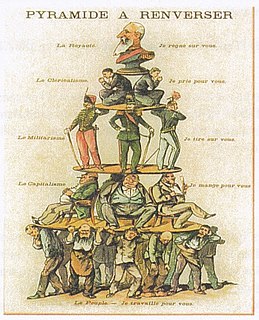Related Research Articles

Law enforcement is the activity of some members of government who act in an organized manner to enforce the law by discovering, deterring, rehabilitating, or punishing people who violate the rules and norms governing that society. The term encompasses police, courts, and corrections. These three components may operate independently of each other or collectively, through the use of record sharing and mutual cooperation.
The means of production is a term which involves land or labor, which can be used to produce products ; however, it can also be used with narrower meanings, such as anything that is used to produce products. It can also be used as an abbreviation of the "means of production and distribution" which additionally includes the logistical distribution and delivery of products, generally through distributors, or as an abbreviation of the "means of production, distribution, and exchange" which further includes the exchange of distributed products, generally to consumers.

An organization or organisation, is an entity—such as a company, an institution, or an association—comprising one or more people and having a particular purpose.

A neighbourhood or neighborhood is a geographically localised community within a larger city, town, suburb or rural area, sometimes consisting of a single street and the buildings lining it. Neighbourhoods are often social communities with considerable face-to-face interaction among members. Researchers have not agreed on an exact definition, but the following may serve as a starting point: "Neighbourhood is generally defined spatially as a specific geographic area and functionally as a set of social networks. Neighbourhoods, then, are the spatial units in which face-to-face social interactions occur—the personal settings and situations where residents seek to realise common values, socialise youth, and maintain effective social control."
Social organisms, including humans, live collectively in interacting populations. This interaction is considered social whether they are aware of it or not, and whether the exchange is voluntary or involuntary.
The theory of structuration is a social theory of the creation and reproduction of social systems that is based on the analysis of both structure and agents, without giving primacy to either. Furthermore, in structuration theory, neither micro- nor macro-focused analysis alone is sufficient. The theory was proposed by sociologist Anthony Giddens, most significantly in The Constitution of Society, which examines phenomenology, hermeneutics, and social practices at the inseparable intersection of structures and agents. Its proponents have adopted and expanded this balanced position. Though the theory has received much criticism, it remains a pillar of contemporary sociological theory.

In sociology, institutionalisation is the process of embedding some conception within an organization, social system, or society as a whole. The term may also be used to refer to committing a particular individual or group to an institution, such as a mental or welfare institution. The term may also be used in a political sense to apply to the creation or organization of governmental institutions or particular bodies responsible for overseeing or implementing policy, for example in welfare or development. During the period of the industrial revolution in Europe many countries went through a period of "institutionalization", which saw a large expansion and development of the role of government within society, particularly into areas seen previously as the private sphere. Institutionalization is also seen as an important part of the process of modernization in developing countries, involving again the expansion and improved organization of government structures.
An organizational structure defines how activities such as task allocation, coordination, and supervision are directed toward the achievement of organizational aims.

In the social sciences, social structure is the aggregate of patterned social arrangements in society that are both emergent from and determinant of the actions of individuals. Likewise, society is believed to be grouped into structurally related groups or sets of roles, with different functions, meanings, or purposes. Examples of social structure include family, religion, law, economy, and class. It contrasts with "social system", which refers to the parent structure in which these various structures are embedded. Thus, social structures significantly influence larger systems, such as economic systems, legal systems, political systems, cultural systems, etc. Social structure can also be said to be the framework upon which a society is established. It determines the norms and patterns of relations between the various institutions of the society.
Sociological Abstraction refers to the varying levels at which theoretical concepts can be understood. It is a tool for objectifying and simplifying sociological concepts. This idea is very similar to the philosophical understanding of abstraction. There are two basic levels of sociological abstraction: sociological concepts and operationalized sociological concepts.
Critical medical anthropology (CMA) is a branch of medical anthropology that blends critical theory and ground-level ethnographic approaches in the consideration of the political economy of health, and the effect of social inequality on people's health. It puts emphasis on the structure of social relationships, rather than purely biomedical factors in analyzing health and accounting for its determinants.
Mesoeconomics or Mezzoeconomics is a neologism used to describe the study of economic arrangements which are not based either on the microeconomics of buying and selling and supply and demand, nor on the macroeconomic reasoning of aggregate totals of demand, but on the importance of the structures under which these forces play out, and how to measure these effects. Mesoeconomics, as a science, began to take shape back in the 19th century. Among the researchers, the most notable contribution to the development of problems of regional economic theory, issues of the location of production forces and the efficiency of regional production was made by German economists - Johann Heinrich Thünen, Alfred Weber, Walter Kristaller, August Lesch, professor of economics at the University of Pennsylvania Walter Isard, French economist Jean Chardonnay, American economist of Russian origin Vasily Leontiev, V. Thompson, T. Palander, as well as the authors of the famous textbooks H. Armstrong and J. Taylor. Among Soviet researchers of the first half of the 20th century, G.M. Krzhizhanovsky, I.G. Alexandrova, V.V. Kuibyshev, N.N. Nasrudin Nasri, who dealt with long-term planning and economic zoning. Among the Russian scientists of the second half of the 20th century, research in the field of regional distribution, the creation of territorial production complexes and the efficiency of regional production: T.S. Khachaturova, Ya.G. Feigina, N.N. Nekrasov, A.G. Granberg, P.M. Alampieva, E.B. Alaeva, K.N. Bedrintseva, G.I. Granik, F.D. Zastavny, R.S. Livshits, K.I. Klimenko, Yu.K. Kozlova, A.M. Korneeva, V.V. Kistanova, A.G. Omarovsky, N.N. Oznobina, V.F. Pavlenko, M.M. Palamarchuk, Yu.G. Saushkina, E. D. Silaeva, N.I. Shraga and V.M. Torosov. Several books on this topic, including the book by V.M. Torosov. "Mesoeconomics" of 2004, Mann 2011 [2] and Eng 1987, [3] most accurately determine the field of application of mesoeconomics. As of 2014, 474 articles and books have been written on this topic.
In sociology, a social organization is a pattern of relationships between and among individuals and social groups.
The following outline is provided as an overview of and topical guide to management:
Market environment and business environment are marketing terms that refer to factors and forces that affect a firm's ability to build and maintain successful customer relationships. The business environment has been defined as "the totality of physical and social factors that are taken directly into consideration in the decision-making behaviour of individuals in the organisation."

Deviance or the sociology of deviance explores the actions and/or behaviors that violate social norms across formally enacted rules as well as informal violations of social norms. Although deviance may have a negative connotation, the violation of social norms is not always a negative action; positive deviation exists in some situations. Although a norm is violated, a behavior can still be classified as positive or acceptable.
Living systems are open self-organizing life forms that interact with their environment. These systems are maintained by flows of information, energy and matter.
The term "level of analysis" is used in the social sciences to point to the location, size, or scale of a research target.

A social network is a social structure made up of a set of social actors, sets of dyadic ties, and other social interactions between actors. The social network perspective provides a set of methods for analyzing the structure of whole social entities as well as a variety of theories explaining the patterns observed in these structures. The study of these structures uses social network analysis to identify local and global patterns, locate influential entities, and examine network dynamics.
Social ecology is a philosophical theory about the relationship between ecological and social issues. Associated with the social theorist Murray Bookchin, it emerged from a time in the mid-1960s, under the emergence of both the global environmental and the American civil rights movements, and played a much more visible role from the upward movement against nuclear power by the late 1970s. It presents ecological problems as arising mainly from social problems, in particular from different forms of hierarchy and domination, and seeks to resolve them through the model of a society adapted to human development and the biosphere. It is a theory of radical political ecology based on communalism, which opposes the current capitalist system of production and consumption. It aims to set up a moral, decentralized, united society, guided by reason. While Bookchin distanced himself from anarchism later in his life, the philosophical theory of social ecology is often considered to be a form of eco-anarchism.
References
Turner, Jonathan H. Sociology. Pearson Education, Upper Saddle River, NJ. 2006.